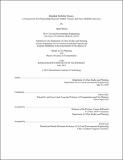Bundled mobility passes : a framework for partnership between public transit and new mobility services
Author(s)
Bansal, Apaar.
Download1139529806-MIT.pdf (4.143Mb)
Alternative title
Framework for partnership between public transit and new mobility services
Other Contributors
Massachusetts Institute of Technology. Department of Urban Studies and Planning.
Massachusetts Institute of Technology. Department of Civil and Environmental Engineering.
Advisor
Jinhua Zhao.
Terms of use
Metadata
Show full item recordAbstract
The emergence and proliferation of "new" mobility has the potential to fundamentally disrupt urban mobility in the 21st century. This includes bikesharing, carsharing, or on-demand vehicles that can be summoned from a smartphone through transportation network companies (TNCs) and microtransit. Competition provided by these services to public transit has often soured the relationship between public authorities and new mobility. However, in the absence of a blanket ban on these services, the public sector needs to find a way to coexist with newer mobility forms, while still upholding system-wide benefits and values of public transportation. One way to coexist is through publicly-guided regulation, but going further than this is to find mutually-beneficial forms of partnership. This thesis proposes bundled mobility passes between public transit, bikesharing, and TNCs, as a potential framework in which the popularity of new mobility can be tapped to strengthen public transit revenue and ridership while at the same time enabling public institutions to regulate these services more effectively. By bringing together stakeholders, the Superpass hopes to cement public transit's place in urban mobility by making the transit pass more appealing. In particular, Chicago is used as a case study for this concept. Enclosed within are the results of an engagement process with employers and employees in the Chicago area, to whom surveys were administered to gauge preferences towards a hypothetical bundled "Superpass" offered by the Chicago Transit Authority (CTA). The surveys found widespread support among employers for such a pass. A discrete choice model was also made from the employee survey results to simulate the choices of employees under different pass scenarios. A scenario analysis found that from this Superpass, the CTA, bikeshare operator, and TNC operator can all at least increase either the number of passes they sell or the number of rides they provide to the market. The CTA, in particular, can potentially increase its pass holders by 6% to 35% and its revenue by 1% to 8% with a 30-day pass add-on bundle, and with a Metra Link-up add-on bundle it can increase pass holders by 11% to 36% and remain about revenue neutral. This thesis also presents an implementation framework for such a pass that could bring together the urban public transit system, the regional commuter rail, the bikeshare operator, the TNC operator, employers, and finally, employees, to ensure the success of this program.
Description
This electronic version was submitted by the student author. The certified thesis is available in the Institute Archives and Special Collections. Thesis: M.C.P., Massachusetts Institute of Technology, Department of Urban Studies and Planning, 2019 Thesis: S.M. in Transportation, Massachusetts Institute of Technology, Department of Civil and Environmental Engineering, 2019 Cataloged from student-submitted PDF version of thesis. Includes bibliographical references (pages 177-180).
Date issued
2019Department
Massachusetts Institute of Technology. Department of Urban Studies and Planning; Massachusetts Institute of Technology. Department of Civil and Environmental EngineeringPublisher
Massachusetts Institute of Technology
Keywords
Urban Studies and Planning., Civil and Environmental Engineering.